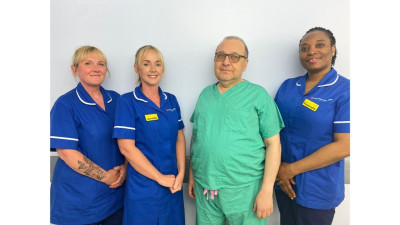Patients with heart failure at Barnet Hospital are accessing consultant-led care from the comfort of their own home, thanks to a ‘virtual ward’ project aimed at helping them recover faster.
Following an assessment to check they are stable, suitable patients are discharged home with a blood pressure monitor and medical-grade scales. They are asked to enter their results into an app each day and the results, along with any symptoms, are monitored by the cardiology team.
Where needed, medication can be adjusted, with doctors available over the phone to respond to any concerns.
Nicolas Karpasitis, 42, from Barnet, says for him the experience has been nothing but positive. He came to Barnet Hospital’s emergency department with breathing problems related to an enlarged heart.
He said: “The cardiology team have been brilliant and I found it really interesting to monitor my own health – in fact I’ve enjoyed playing a role in my recovery. At one point I did have to come back in as an inpatient, but the majority of time was spent at home. When I was finally discharged off the virtual ward it felt a bit sad actually, it felt like losing a friend as I enjoyed chatting to the team. Now I continue to be monitored but not as intensely.”
Dr Nelson Amaral, the consultant cardiologist behind the project, said: “We recognised that a virtual ward could be a perfect fit for heart failure patients. These patients often experience lengthy hospital stays, but in many cases, close monitoring can be effectively conducted from at home where they can enjoy a better night’s sleep. As we know, familiar surroundings are a significant factor in patient wellbeing.”
The virtual ward utilises a user-friendly app to monitor weight, blood pressure, and any other relevant symptoms. This allows the team to promptly adjust medication as needed. Strict criteria are in place, patients must be medically stable and have the capacity to actively participate in their care. Access to a smartphone is also a requirement.
Jennifer Lane, a heart failure clinical nurse specialist, said:
“Previously patients were waiting up to a month for their first clinic appointment and up to nine months for a follow-up appointment. Now we’re able to review patients the day after discharge from their own home. During their two weeks on the virtual ward they come in regularly for blood tests and receive medication which is rapidly increased to the top tolerated dose. Nicolas’s case was particularly complex but being on the virtual ward highlighted the issues he was facing and prevented him returning to us via A&E.
“We currently have 10 patients on the virtual ward at any one time and that number will rise.”
Although the team is still collecting and evaluating the data, they believe the results will show better outcomes for patients.
The project has been funded by the North Central London Integrated Care System (NCL ICS).
Staff from the virtual ward care team

 Translate
Translate